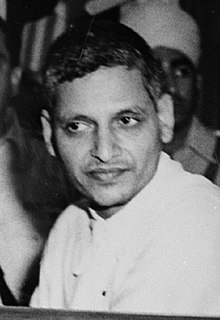Published in Outlook on Apr 27 1998
THE RSS has great difficulty in either acknowledging or rejecting Nathuram Godse. The official line is that the RSS had nothing to do with Godse and he was not a member when he killed Mahatma Gandhi. But only three months ago Professor Rajendra Singh, RSS chief, told Outlook: "Godse was motivated by akhand Bharat. His intention was good but he used the wrong method."
Born in 1908 in the family of a village post master, Godse was drawn to the philosophy of Hindu nationalism. In his early days he participated in stray movements against caste discrimination to "reform Hindu society". He was a moderately educated person, with a fairly good command of English, greatly influenced by the writings of Veer Savarkar, president of the aggressive Hindu Mahasabha. He had also read Dadabhai Naoroji, Tilak and Gokhale.
In 1930, at the age of 22, Godse became a member of the RSS, which was then considered to be an organisation of Marathi Bra-hmin youths. Very soon he carved a niche for himself in the Sangh and became 'baudhik pracharak' (intellectual propagator). His brother Gopal Godse says, "Nathuram had declared before the court that he had left the RSS in 1934 as the then RSS chief was facing a lot of trouble. But he actually never left the organisation." In those days, the RSS didn't maintain a record of the membership, and, therefore, the organisation has little difficulty in disowning Godse. The RSS headquarters in Delhi recently instructed Suruchi Prakashan not to sell any literature on Godse.
A unified India comprising Pakistan, Bangladesh and Myanmar was Godse's dream and in his will he decreed that his "ashes may be immersed in the holy Sindhu river when she will again flow freely under the aegis of the flag of Hindustan." As a member of the RSS, Godse once went on a tour with its founder K.B. Hedgewar. In 1934 he left the RSS because he wanted to transform the RSS—"a cultural outfit"—into an aggressive Hindu political party. At that time, the Hindu Mahasabha was the only "political party of Hindus" which preached militarisation of Hindus. Soon after coming into contact with Savarkar, Godse became a member of the party. Later, he became general secretary of its Pune branch. But gradually he started feeling uncomfortable in the Hindu Mahasabha because he thought Savarkar was being soft on the Congress.
In 1944, Godse along with his friend Narayan Apte launched a newspaper called Hindu Rashtra from Pune to propagate the ideology. He was closely monitoring Gandhi whose efforts to bring about Hindu-Muslim unity infuriated him. Interestingly, when M.S. Golwalkar became RSS chief, he ridiculed Gandhi's stand of "no swaraj without Hindu-Muslim unity". At 5.10 pm on January 30, 1948, Godse fired three shots at Gandhi at Birla Bhavan. His newspaper carried the story of the assassination mentioning the name of its editor as the assassin. Godse and accomplice Apte were hanged in Ambala jail on November 15, 1949.
Source : http://www.outlookindia.com/article.aspx?205425



No comments:
Post a Comment